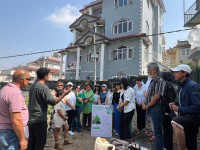Valley
Ordeals of children in brick factories
Eleven-year-old Biru Krisan Paswan from Darbhanga, Bihar works as a labourer at Lakshmi brick kiln in Bhaktapur.
Paswan is just one of the hundreds of children labouring at brick kilns in the Valley. According to a survey carried out by international organisation, Save the Children, and its local partner, Child Development Society, 621 children aged between 3-18 work in 31 brick kilns in Bhaktapur. The Valley has 108 brick factories in operation at present, of which 62 are in Bhaktapur, 25 in Lalitpur and 18 in Kathmandu.
Despite both government and non-government organisations running intervention programmes in these factories, children continue to be hired as labourers in appalling conditions.
“The brick sheds where families live do not have toilets, drinking water facilities or doors. Stories of sexual harassment in these sheds are unbelievable,” said Nilam Dhanuse, programme coordinator at Save the Children.
Along with its local partner and some brick factories, the international organisation runs five day-care centres coaching classes for child labourers in nine different schools and informal classes within the premises of six factories in Bhaktapur. And although their intervention has improved the situation of children, the owners and managers of the factories are the ones who have a direct impact.
According to Yuvaraj Rokka, programme coordinator at Child Development Society, unwanted pregnancies are part of some gruesome realities in these factories; so are deaths by drowning of little children in pools. “Alcohol is another big problem, especially when a group of young men drink in the same shed a group of young women live,” said Rokka. Last year, Bhaktapur passed a plan in which it announced to eliminate child labour from the district in five years. But with a glaring disobedience of Child Labour Act 2000, district officials know they have a tough task ahead.
“It will be very difficult to banish child labourers from brick kilns, but we have a strategic plan and we hope to teach parents the value of education and discourage them from taking their kids along to work,” added Hem Nath Dawadi, chief district officer of Bhaktapur. The vice president of Bhaktapur Brick Entrepreneurs Association, Bishwa Ram Kawa, thinks the parents, even while at work, should take responsibility of their children. “The parents complain that if they leave their children behind, especially those in their early- and mid-teens, the kids will turn into delinquents.
We cannot ask them to take that risk; neither can we provide education to their children here. But we are doing as much as we can,” said Kawa.




 21.72°C Kathmandu
21.72°C Kathmandu










